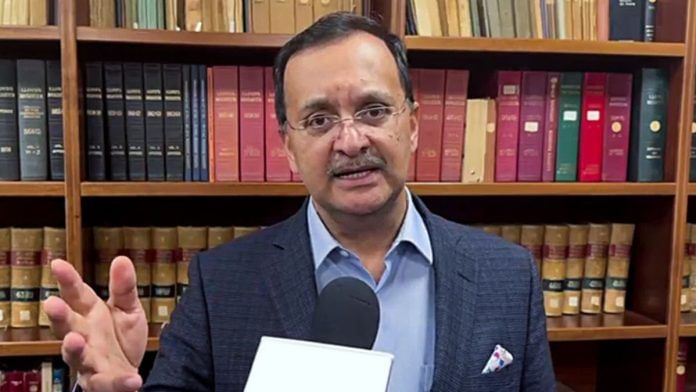New Delhi: High Commissioner of India to Canada Dinesh K. Patnaik highlighted that evidence submitted by New Delhi on transnational criminals is “not enough”, however any evidence submitted by Ottawa is considered “enough” in an interview with the Canadian newspaper The Globe and Mail recently.
“Your evidence is enough but our evidence is not enough?” Patnaik asked, speaking to the Canadian newspaper, highlighting India’s frustrations with the lack of seriousness with which Ottawa handles New Delhi’s security concerns. Patnaik stressed that India perceives Canada is doing little to address the “illegal activities” of Sikh separatists on its own soil.
“He complained that Canada is doing little to stop illegal activities by some Canadian Sikhs, who promote a separate Khalistan state in Punjab,” The Globe and Mail story said. India has shared dossiers with Canadian officials and names of at least 25 individuals of interest for their illegal activities. However, little action by Canada has been seen.
Ties between India and Canada cratered in September 2023 after then Canadian Prime Minister Justin Trudeau alleged links between Indian Government officials and the killing of Sikh separatist Hardeep Singh Nijjar. Nijjar was killed outside a gurdwara in June 2023 in Surrey, British Columbia.
When ties first saw a disruption, Canada named and expelled an Indian official posted in the High Commission in Ottawa as an intelligence officer linked to the Research and Analysis Wing (R&AW). India also expelled a Canadian intelligence official from its mission in New Delhi for being a part of the Canadian Security and Intelligence Service (CSIS).
India soon called for parity in ties and in October 2023, 41 Canadian diplomats and their dependents left the missions in India. A year later in October 2024, India expelled a further six Canadian diplomats including the then Acting High Commissioner Stewart Wheeler from the High Commission in New Delhi.
In a separate statement to The Canadian Press, Patnaik made it clear that for any return of Canada’s full strength of diplomats to India, Ottawa must first resolve the delays in accreditation of Indian diplomats. He has urged that trust “has to be built up on both sides”.
India-Canada security partnership
Ottawa recently designated the Lawrence Bishnoi gang as a terrorist entity, indicating its own domestic pressures to take action against transnational criminal gangs. Patnaik has consistently raised how Canada acts with regards to allegations. In an earlier interview to CTV News, the Indian High Commissioner said, “We lost trust because we felt there was an allegation without any substance.”
However, under Prime Minister Mark Carney, India and Canada have focused on rebuilding trust at the security level. Canadian National Security and Intelligence Adviser (NSIA) Nathalie G. Drouin met India’s National Security Adviser (NSA) Ajit Donal last month.
PM Modi held a bilateral with Carney in June on the margins of the G7 summit where the two leaders agreed to take steps to improve and stabilise ties. In August, both countries simultaneously announced High Commissioners in a bid to break the diplomatic impasse.
In the latest interview to The Globe and Mail, Patnaik highlighted that India’s law enforcement agencies are “now exchanging information” and looking for closer cooperation with Canadian agencies, as the two governments are looking to stabilise security ties.
India has long raised the issue of transnational gangs and Sikh extremism given space in Canada. New Delhi has raised the issue of safety and security of its diplomats, and even suspended the operations of its missions in Canada in September 2023.
Just last week Patnaik told The Globe and Mail that Sikh separatists showed up outside his residence with posters targeting the High Commissioner and offering a $10,000 bounty. Across Canada in the past, there have been such protests offering rewards to individuals with a bounty on Indian diplomats.
When ties cooled, in October 2024, India withdrew six of its diplomats from its missions across Canada including High Commissioner Sanjay Kumar Verma after Ottawa called for the waiver of their diplomatic immunity.
The political relationship between Prime Minister Narendra Modi and then Canadian Prime Minister Justin Trudeau was non-existent, especially after a contentious bilateral meeting in New Delhi on the margins of the G20 summit in New Delhi in September 2023.
Another area where the India-Canadian partnership had hit a roadblock was the negotiations for a free trade agreement. In early September 2023, Canada announced the suspension of trade talks. Talks are now underway.
India’s high level political engagement with Canada has increased, with Canadian Foreign Minister Anita Anand visiting New Delhi last week. Anand called on Prime Minister Modi and held bilateral discussions with External Affairs Minister S. Jaishankar.
Carney has been invited to attend the Artificial Intelligence (AI) summit in February 2026, and expectations are high for such a visit. It would be the first visit by Carney to India as Prime Minister of Canada.
(Edited by Viny Mishra)






